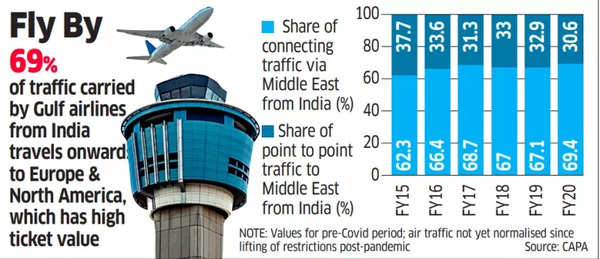However, India is seeking to create a more favorable position for its airlines on international routes, according to an ET report.
Under the bilateral air service agreement signed between the United Arab Emirates (UAE) and India in January 2014, both nations’ airlines are permitted to operate a combined total of 66,000 seats per week between Dubai and 15 Indian cities. This quota has been fully utilized by both Indian and UAE airlines, leaving no room for additional flights. The UAE has requested the Indian Ministry of Civil Aviation to increase the number of seats for Dubai by an additional 50,000.

Flight traffic trends
An official stated that Indian airlines primarily provide point-to-point service to Dubai, while UAE-based airlines use their allocations for Sixth Freedom traffic to Europe and North America, which are more lucrative routes. Sixth Freedom traffic refers to passengers traveling from one country to another via airports. In the fiscal year 2019-20, 69% of Indian passengers flying to Europe and North America used West Asian hubs such as Dubai, Abu Dhabi, and Doha on foreign airlines.
Furthermore, it was noted that Indian carriers did not receive any state funding during the Covid crisis, whereas UAE airlines benefited from substantial government support. The Indian government, led by Prime Minister Narendra Modi, aims to provide a level playing field for Indian carriers like Air India and IndiGo on medium- and long-haul routes to Europe and North America.
This move has the support of Air India, which seeks to expand its business on long-haul routes using wide-body aircraft.
Air India’s CEO, Campbell Wilson, expressed concerns about excess capacity that allows passengers to choose other airlines for travel to North America, hindering Air India’s operations. He emphasized the importance of nurturing the local market for the benefit of the economy.
Emirates and Turkish Airlines have criticized these protectionist measures, arguing that they will harm consumers. Emirates President Tim Clark highlighted that approximately 65% of international flights operated by Indian carriers are destined for Dubai. He cautioned that failing to expand capacity would result in Indian citizens losing out and a loss of $800-900 million in annual income for the carriers.
Read From ET |India’s demand from Dubai airlines
The Indian government is also developing a national policy to transform its airports into major international hubs, providing seamless international connectivity to the entire South Asian region. This policy, which requires cabinet approval, aims to streamline security and immigration processes at airports, allocate international flying rights, and develop necessary infrastructure. The objective is to position airports like New Delhi as competitive transit hubs, rivaling popular destinations such as Dubai and Singapore Changi Airport.